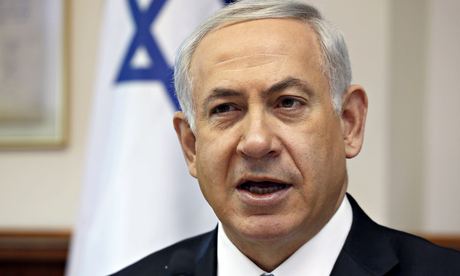
Benjamin Netanyahu blames the Palestinians for the breakdown
in the US-brokered peace talks. Photograph: Gali Tibbon/AP
Israel has hit
back hard following an agreement on Palestinian unity by
suspending already faltering peace negotiations just days before
the expiry of a deadline for the US-brokered process.
The Israeli prime minister, Binyamin
Netanyahu, accused the western-backed Palestinian president, Mahmoud
Abbas, of forming an alliance with Hamas, which he called "a
terrorist organisation that calls for the destruction of Israel"
– and hinted at further retaliatory measures.
Netanyahu's comments followed Wednesday's
announcement of a unity agreement between
Abbas' Fatah movement – the dominant group in the PLO and which
governs parts of the West Bank – and Hamas, which controls the
Gaza Strip. The US and EU also classify Hamas – whose name means
the Islamic Resistance Movement – as a terrorist group, but may
review their policies in the light of the unity deal.
"What has happened is a great reverse for peace, because we had
hoped the Palestinian Authority [PA] president Abbas would
embrace the Jewish state, the idea of two nation states,
Palestinian one and a Jewish one," Netanyahu told NBC. "But
instead, he took a giant leap backward."
But there was confusion about whether the decision to suspend
talks was taken by Netanyahu or the Israeli security cabinet.
According to a senior Israeli official, the meeting of senior
ministers ended without a clear decision to suspend talks until
the Hamas-backed unity government was formed. But some ministers
were surprised by Netanyahu's announcement.
A source close to his office, while refusing to discuss details
of the meeting, was clear that peace talks had been suspended by
Netanyahu, but added that day-to -day contacts on issues like
security would continue.
Palestinian officials said they would now be considering "all
options".
On the face of it, the decision to suspend talks is a blow to
the US secretary of state, John
Kerry, who has spent almost nine months trying to coax
Israelis and Palestinians into an agreement about the conflict's
most contentious issues. In recent weeks, however, the two sides
had moved further apart over prisoner releases, PA moves to join
UN bodies and Israeli settlement expansion.
The US has rejected criticism that it helped provide Israel with
an exit route from ailing Palestinian peace talks, insisting
there is still a slim chance of bringing the two sides back to
negotiations.
Kerry phoned Abbas to express US "disappointment" in his
alliance with Hamas.
The peace negotiations had been scheduled to expire next
Tuesday, with scant hope of an extension. "The idea that the
Palestinian unity deal sets anything back on the peace process
is not credible because nothing was happening and it was clear
to everyone that nothing was going to," said Daniel Levy of the
European Council on Foreign Relations thinktank. "Let's not lie
to ourselves that things would have changed if the talks had
continued."
Israeli anger at the Fatah-Hamas deal was predictable. But some
observers suggested the situation suited Israel's prime
minister. "With the deal, Netanyahu
had a perfect alibi," wrote Noam Sheizaf. "After all, if
Abbas is back to doing business with an organisation that
refuses to recognise Israel and believes in armed resistance,
one cannot blame the Israeli government for abandoning the peace
process."
If it holds – three previous attempts have not – the unity deal
will end a debilitating seven-year split in Palestinian ranks
that has played into Israel's hands and cut off Gaza and its 1.7
million people from the West Bank and from negotiating efforts.
But important differences still separate the two sides: the
PLO/PA has recognised Israel and seeks a two-state solution to
the conflict. It co-operates on security with Israel – arresting
Hamas activists. Hamas refuses to recognise Israel though it is
prepared for a long-term truce. It has observed a ceasefire in
Gaza. It is hostile to the idea of a two-state solution though
sometimes ambiguous about it.
The reconciliation has grown out of the failure of the peace
talks. It has advantages for Abbas, who faces a crisis of
legitimacy and has nothing to show for his moderation – enemies
call it "collaboration" –except more Israeli settlements. Moves
toward unity and the promise of elections within six months will
be popular. Hamas, the weaker party, has suffered from
stagnation in Gaza and the loss of support from Egypt after the
overthrow of the Muslim Brotherhood. "Hamas," said a veteran
observer of the Palestinian scene, "has got nowhere else to go,
nothing better to do."
Abbas, who succeeded Yasser Arafat as PLO leader but has none of
his charisma, has insisted that any reconciliation with Hamas
will be on his terms and that he will remain in charge of
negotiations policy. Western diplomats insist that it will have
to be so if the US and EU, which bankroll the PA and fear the
consequences of its collapse, are to continue paying.
The EU said it welcomed the Palestinian unity agreement but said
the priority remains peace talks with Israel. The US state
department said: "Any Palestinian government must unambiguously
and explicitly commit to nonviolence, recognition of the state
of Israel, and acceptance of previous agreements and obligations
between the parties. If a new Palestinian government is formed,
we will assess it based on its adherence to the stipulations
above, its policies and actions, and will determine any
implications for our assistance based on US law."
ALSO SEE
FOUR BLOOD MOONS
http://www.greatdreams.com/blog-2013-3/dee-blog577.html
FOUR BLOOD MOONS LINKED TO SHEMITAH
http://www.greatdreams.com/blog-2014/dee-blog667.html
SHEMITAH DEFINED
http://www.greatdreams.com/blog-2014/dee-blog666.html
